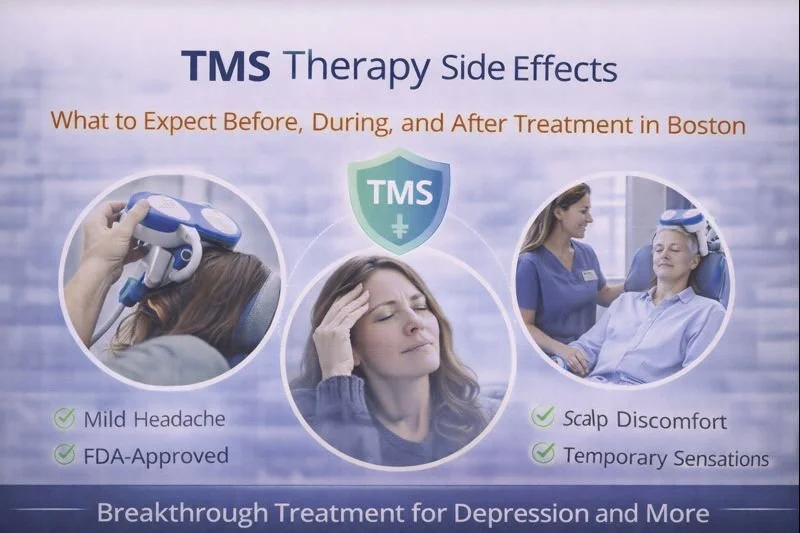TMS Therapy Side Effects: What to Expect Before, During, and After Treatment in Boston
Understanding TMS Therapy
Transcranial Magnetic Stimulation (TMS) therapy is an FDA-approved, non-invasive treatment for depression, anxiety, and other mental health conditions. As an alternative for individuals who have not found relief with medication, TMS therapy in Boston is becoming an increasingly popular option.
However, like any medical treatment, TMS therapy has potential side effects. Understanding what to expect before, during, and after treatment can help you make an informed decision.
What to Expect Before TMS Therapy
1. Initial Consultation
Before beginning TMS therapy in Boston, patients undergo an evaluation with a healthcare provider. This consultation assesses:
Medical history
Mental health condition(s)
Previous treatments and medications
Suitability for TMS therapy
What to Bring to Your TMS Consultation
A list of current medications
Any previous mental health treatment records
Insurance information for coverage verification
Questions about the treatment process and potential outcomes
2. Insurance and Coverage Considerations
Many insurance plans cover TMS therapy in Boston, but coverage varies. Patients should check with their provider and discuss financing options with their treatment center.
How to Verify TMS Therapy Coverage
Contact your insurance provider for specific coverage details
Ask your TMS clinic if they offer insurance assistance
Explore financing or payment plans if coverage is limited
3. Preparing for Treatment
Patients do not need to take special precautions before their TMS therapy session. However, they should:
Avoid caffeine before the session if they are sensitive to stimulation
Continue taking prescribed medications unless otherwise advised
Inform the provider of any metal implants or conditions that could interfere with the procedure
Can You Eat or Drink Before a TMS Session?
Yes, it’s recommended to eat a light meal and stay hydrated before treatment to prevent lightheadedness.
What to Expect During TMS Therapy
TMS therapy sessions typically last 20 to 40 minutes, depending on the treatment plan. Here’s what happens during a typical session:
1. Placement of the Magnetic Coil
The technician positions a magnetic coil against the patient’s scalp, targeting the prefrontal cortex.
The device delivers painless magnetic pulses to stimulate brain activity.
How the Coil Location is Determined
A trained provider maps the brain to identify the optimal stimulation area.
Adjustments may be made based on patient response and comfort.
2. Sensations and Discomfort
Patients may feel a tapping or tingling sensation on the scalp.
Mild headache or facial muscle twitching is common but usually subsides within minutes.
The intensity of the stimulation can be adjusted for comfort.
Does TMS Therapy Hurt?
Most patients describe the sensation as a light tapping rather than pain. The feeling often becomes more comfortable after the first few sessions.
3. Duration and Frequency
Treatment occurs five times per week for four to six weeks.
Patients remain awake and alert throughout the session.
Many people use the time to relax, listen to music, or meditate.
Can You Drive After a TMS Session?
Yes, TMS does not cause drowsiness, so patients can drive themselves home or return to work immediately after treatment.
What to Expect After TMS Therapy
Unlike medication-based treatments, TMS therapy has minimal systemic side effects. However, some patients may experience mild discomfort after their sessions.
1. Immediate Post-Treatment Effects
Mild headache (common in the first few sessions, typically managed with over-the-counter pain relief)
Scalp discomfort or tingling (temporary and fades after treatment)
Lightheadedness (rare but resolves quickly)
How Long Do Side Effects Last?
Most side effects subside within 30 to 60 minutes after a session.
2. Long-Term Side Effects
TMS therapy does not have the same side effects as medications, such as weight gain or drowsiness. However, some patients report:
Temporary mood swings or increased anxiety in the early weeks of treatment
Mild fatigue, particularly if sessions are early in the morning
How to Manage Mood Swings During TMS
Practice stress-reducing activities like yoga or mindfulness.
Keep a mood journal to track emotional responses.
Consult your provider if mood changes persist beyond the first few weeks.
3. Rare and Serious Side Effects
While very rare, serious side effects include:
Seizures (less than 0.1% of patients)
Hearing sensitivity (due to the clicking sounds during treatment; ear protection is provided)
Who Should Avoid TMS Therapy?
Patients with a history of seizures, metal implants, or specific neurological conditions should consult a doctor before starting treatment.
How to Minimize TMS Therapy Side Effects
To enhance comfort and reduce side effects during TMS therapy in Boston, patients can:
1. Manage Scalp Sensitivity
Use over-the-counter pain relievers like ibuprofen or acetaminophen if mild headaches occur.
Adjust the coil positioning with the technician to reduce scalp discomfort.
Apply a warm compress to the treated area after sessions if experiencing soreness.
2. Reduce Noise Sensitivity
Wear earplugs during treatment to protect against the clicking sounds.
If noise sensitivity persists, consider customized ear protection designed for TMS sessions.
3. Prevent Fatigue and Lightheadedness
Ensure adequate sleep before your session.
Stay hydrated and eat a balanced meal before treatment.
Rest for a few minutes after the session before resuming normal activities.
4. Manage Mood Swings or Anxiety
Engage in relaxation techniques such as deep breathing or meditation before and after sessions.
Keep a journal to track emotional responses and discuss any concerns with your provider.
Stay active with light exercise to boost mood and energy levels.
5. Communicate with Your Provider
If side effects persist, discuss adjustments to intensity settings with your TMS provider.
Report any unusual symptoms to ensure your treatment remains safe and effective.
Consider additional supportive therapy, such as cognitive-behavioral therapy (CBT), to complement TMS.
When to Call Your Doctor About Side Effects
If headaches or scalp pain worsen or persist.
If you experience severe mood changes or increased anxiety.
If you have any new or unusual neurological symptoms.
By following these strategies, most patients can complete their TMS therapy with minimal discomfort
***
🌟 Looking for TMS Therapy Near You? Where to Get TMS Therapy for Depression in Boston
📍 Conveniently located near:
✅ Boston, Cambridge, Newton, Alston, Somerville, & Back Bay
Dignity Brain Health - TMS Therapy Clinic
💡 Why Choose Dignity Brain Health for TMS?
✔️ Expert Boston TMS Specialists – Harvard Medical School-trained; Treating depression with TMS since 2017.
✔️ Personalized Treatment Plans – Tailored to your unique mental health needs.
✔️ Insurance-Friendly Process – We handle the paperwork for you.
✔️ Proven Results – TMS can improve symptoms for patients who haven’t responded to medication.
📅 Take the First Step Toward Relief
👉 📆 Find Out If TMS Is Right for You; Book Your TMS Consultation Now (Insurance-Covered)
💬 Still have questions? Contact us today and speak with a specialist about whether TMS therapy is right for you!
***
🌍 Mental Health Resources in Boston for Depression & TMS Therapy
If you or a loved one are struggling with depression, these trusted resources in Boston offer professional support:
🔹 Massachusetts General Hospital Psychiatry Department – Offers psychiatric evaluations, therapy, and medication management for depression and anxiety.
🔹 Boston University Center for Psychiatric Rehabilitation – Specializes in mental health recovery programs, vocational rehabilitation, and outpatient services.
🔹 Samaritans Boston (Suicide Prevention) – A free 24/7 crisis helpline offering confidential emotional support.
Dignity Brain Health is committed to helping patients find the best mental health care in the greater Boston area.
References
Klomjai, W., Katz, R., & Lackmy-Vallée, A. (2015). Basic principles of transcranial magnetic stimulation (TMS) and repetitive TMS (rTMS). Annals of physical and rehabilitation medicine, 58(4), 208–213. https://doi.org/10.1016/j.rehab.2015.05.005
Mayo Clinic. (2022). Transcranial magnetic stimulation (TMS). Retrieved from https://www.mayoclinic.org/tests-procedures/transcranial-magnetic-stimulation/about/pac-20384625
National Institute of Mental Health (NIMH). (2023). Brain stimulation therapies. Retrieved fromhttps://www.nimh.nih.gov/health/topics/brain-stimulation-therapies/brain-stimulation-therapies
—
CONTACT INFO:
DIGNITY BRAIN HEALTH
1101 BEACON STREET, SUITE 8W
BROOKLINE, MA, 02446
UNITED STATES
Phone: (617) 855-7288



